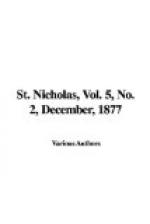Early one bright May morning, Jesus, then a little boy of ten or twelve years, awoke, and at once remembered that it was a holiday. His eyes, bright with the morning light, sparkled yet more brightly at the thought. There would be no school, no work. All the people would keep the feast. He knew, too, that on that day, the boys of his age would assemble betimes to play together at The Holy Well. So, brimful of joyful expectation, he ran to ask his mother’s leave to go and join in the merry games. Soon he was on his way, and he quickened his steps when he came in sight of the troops of happy children running hither and thither in their sports. Drawing nearer, he stood still a little while, watching the games with pleased and eager eyes. Then he called out: “Little children, shall I play with you, and will you play with me?” Now, these boys and girls were the children of rich parents, and lived in much finer houses than the one Jesus had for a home. They had handsome clothes, too, and everything of the best. So they looked on the plainly dressed stranger, the son of a poor carpenter, and bade him begone, saying: “We will not play with you, or with any such as you!” What a rebuff was that! The poor, sensitive little lad had not expected it, and his tender feelings were hurt. His eyes filled with tears; and running home as fast as he could, he laid his head in his mother’s lap, and sobbed out to her the whole story. Then Mary was angry with the ill-natured children, and told her son to go back and destroy them all by his word; for she believed that her beautiful boy could do such things. But, surely, if he could have harbored that thought, he would not have been beautiful; and so, when his mother spoke, her words drew away his thoughts from himself to the children who had grieved him. He knew that they had never really known him, and so could not have understood what they were doing. Therefore he said to his mother that he must be helpful and gentle to people, and not destroy them. And that was the way with him to the very end. For when, years after, the people (perhaps among them some of those same children grown-up) were putting him to death on a cross, he bethought him again that they did not really know him, and prayed: “Father, forgive them; they know not what they do.” And, even before then, he had told all people to love their enemies, and forgive and be good to one another. If he had not done all that, Christmas would not be so happy a time for us.
Mrs. B. [approaching her husband and laying her hand on his shoulder]. John, is not he right?
Mr. B. [who has been lost in thought, starting and abruptly walking aside]. He is right! So are they all. [Turning about.] Dear wife, Lucy, Tommy, May, you shall be happy! We’ll have the Remsens! I say, we’ll have our dear old friends. Patrick shall harness the horse at once, and—[The Minstrel suddenly strips off his disguise and reveals himself as MR. REMSEN.] What! Remsen! Is that you?




